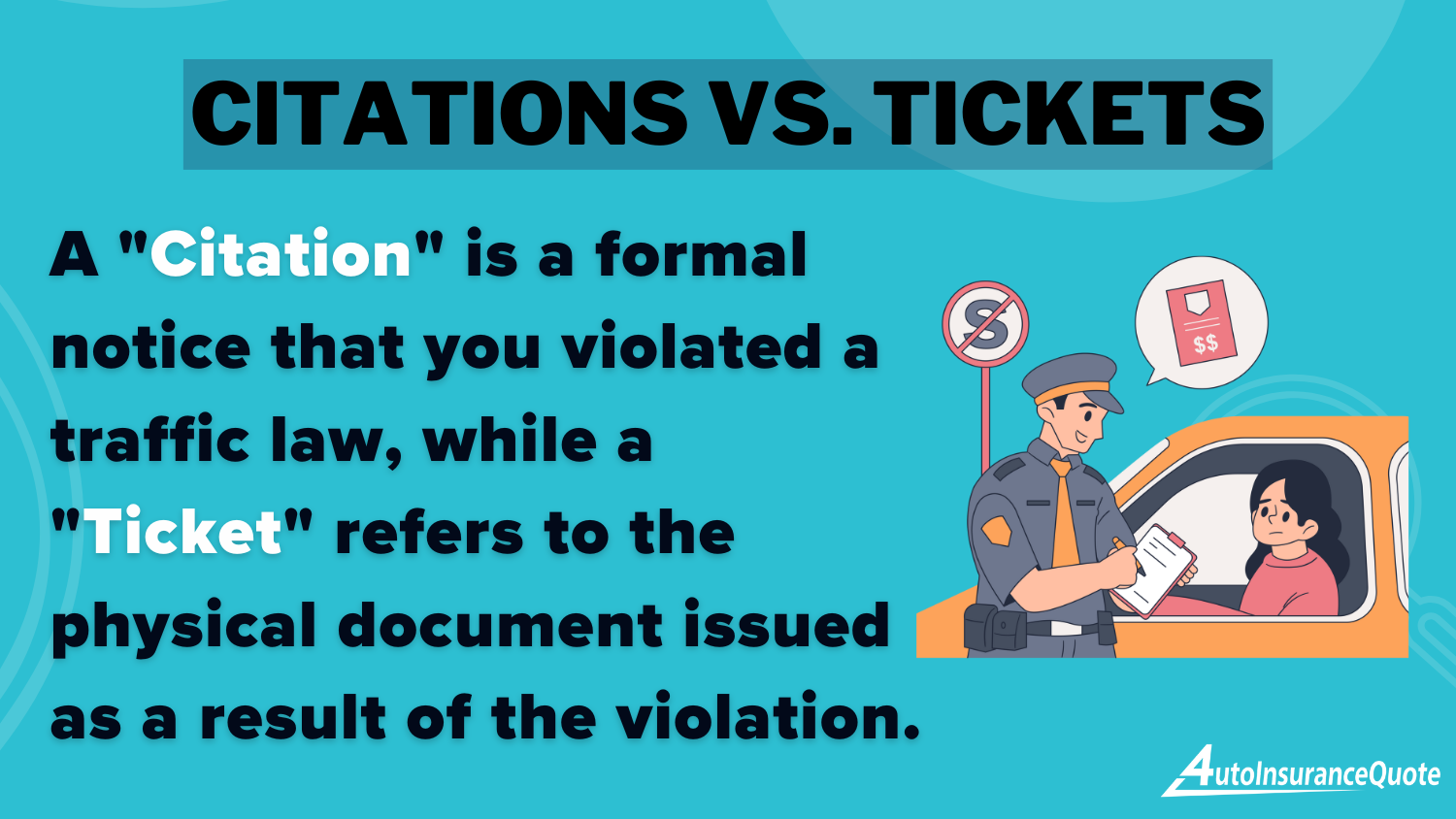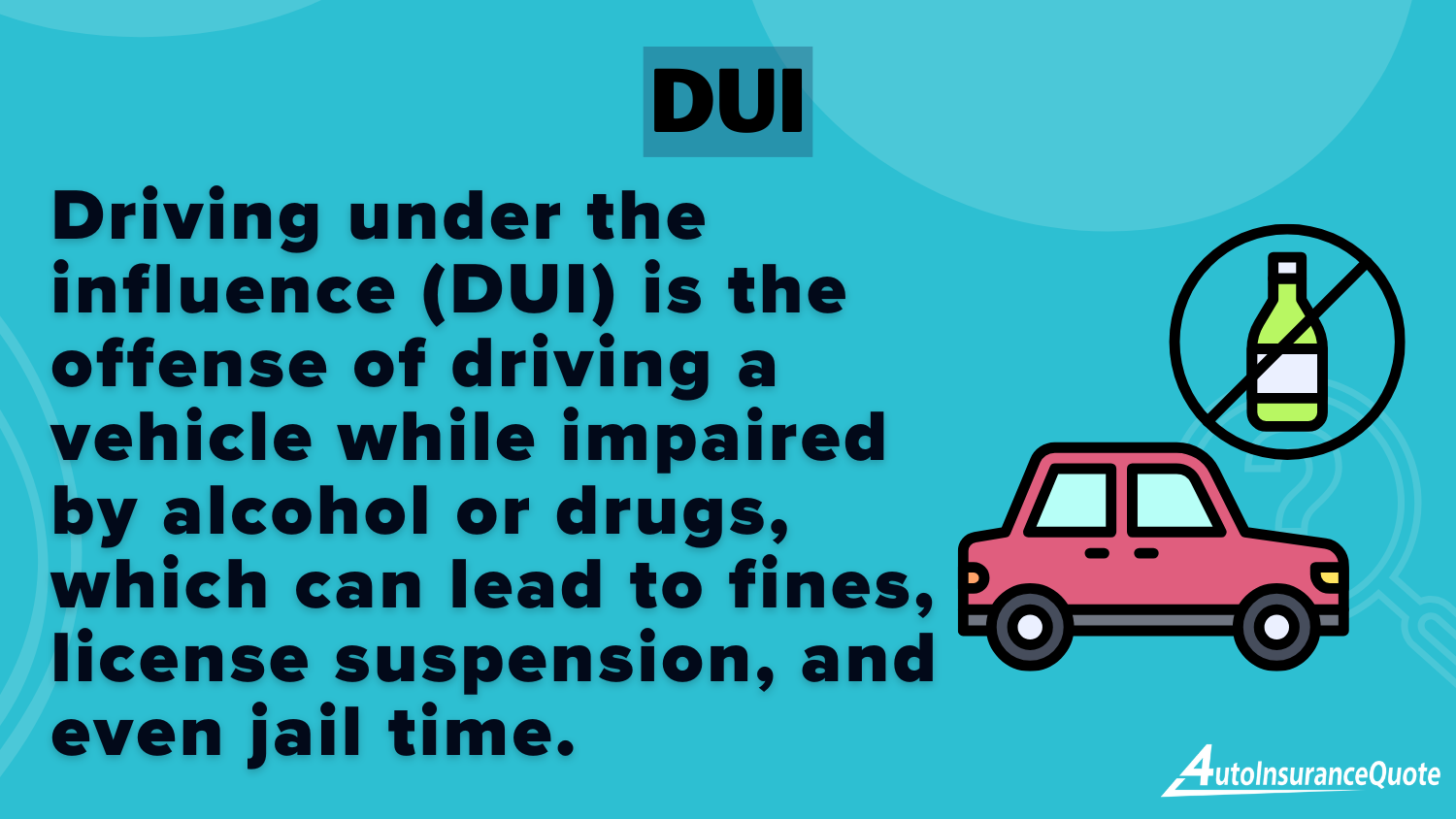Citations vs. Tickets in 2025 (Differences Explained)
Citations vs. tickets both refer to traffic violations, but citations can sometimes be more severe. A citation often requires court appearances, while a ticket usually involves fines. Citations and tickets can increase auto insurance premiums by 5% to 30% per month, depending on the offense.

Free Car Insurance Comparison
Compare Quotes From Top Companies and Save
Secured with SHA-256 Encryption
Daniel Walker
Licensed Insurance Agent
Daniel Walker graduated with a BS in Administrative Management in 2005 and has run his family’s insurance agency, FCI Agency, for over 15 years (BBB A+). He is licensed as an insurance agent to write property and casualty insurance, including home, life, auto, umbrella, and dwelling fire insurance. He’s also been featured on sites like Reviews.com and Safeco. To ensure our content is accura...
Licensed Insurance Agent
UPDATED: Dec 11, 2024
It’s all about you. We want to help you make the right coverage choices.
Advertiser Disclosure: We strive to help you make confident auto insurance decisions. Comparison shopping should be easy. We are not affiliated with any one auto insurance provider and cannot guarantee quotes from any single provider.
Our insurance industry partnerships don’t influence our content. Our opinions are our own. To compare quotes from many different companies please enter your ZIP code on this page to use the free quote tool. The more quotes you compare, the more chances to save.
Editorial Guidelines: We are a free online resource for anyone interested in learning more about auto insurance. Our goal is to be an objective, third-party resource for everything auto insurance related. We update our site regularly, and all content is reviewed by auto insurance experts.
UPDATED: Dec 11, 2024
It’s all about you. We want to help you make the right coverage choices.
Advertiser Disclosure: We strive to help you make confident auto insurance decisions. Comparison shopping should be easy. We are not affiliated with any one auto insurance provider and cannot guarantee quotes from any single provider.
Our insurance industry partnerships don’t influence our content. Our opinions are our own. To compare quotes from many different companies please enter your ZIP code on this page to use the free quote tool. The more quotes you compare, the more chances to save.
On This Page
Citations vs. tickets might seem like two different things, but they’re actually pretty much the same—they both mean you’ve violated a traffic law. A citation is a formal notice, which could require a court appearance, while a ticket usually just comes with a fine.

On average, a traffic violation can raise your car insurance rates by 5% to 30%, depending on the severity of the offense. Serious violations, like speeding or running a red light, can have a bigger impact, while smaller ones, like parking violations, might not affect your rates as much.
It’s important to compare auto insurance quotes from top-rated providers to find the best deal and keep your premiums as low as possible. Doing this helps you understand how violations affect your rates and find coverage that fits your budget.
Stop overpaying for auto insurance. Enter your ZIP code to find out if you can get a better deal.
- Citations and tickets both signal violations, but citations may require court
- Citations often lead to higher insurance rates than tickets
- Understanding the difference helps manage insurance costs
Citations vs. Tickets Explained
When it comes to traffic violations, people often ask about the citation and ticket difference. A citation is an official notice from the police saying you broke a traffic law, like speeding, running a red light, or failing to stop.
The definition of a police citation is a written notice for an offense and may require you to go to court or pay a fine. A ticket is a physical piece of paper that shows the violation and the fine owed.
Citations vs. Tickets Full Coverage Auto Insurance Monthly Rates by Provider| Company | Citations | Tickets |
|---|---|---|
| $210 | $190 | |
| $200 | $180 | |
| $215 | $195 | |
| $190 | $170 | |
 | $220 | $200 |
 | $205 | $185 |
| $200 | $180 | |
| $190 | $170 | |
| $215 | $190 | |
| $180 | $160 |
The citation meaning in relation to a ticket is that they are basically the same thing. Both show you broke the law and could cause your insurance rates to go up.
The citation meaning in law explains that citations for serious offenses, like a DUI, might require you to go to court, while smaller tickets, like parking violations, can usually just be paid.
The meaning of traffic citation includes violations like speeding tickets, which are official proof you broke a rule. Whether it’s called a citation or a ticket, both mean the same and can affect your clean driving record and insurance.
Differences Between a Citation for Speeding and a Speeding Ticket
A speeding ticket and a citation are basically the same thing. Both mean you broke a traffic law, like speeding, DUI, or running a red light, and they usually come with a fine or a court date. For serious offenses, like DUI or DWI, you have to go to court and might face higher fines or even jail time.
Auto Insurance Monthly Rates by Driving Record & Provider| Insurance Company | Clean Record | One Accident | One DUI | One Ticket |
|---|---|---|---|---|
| $318 | $416 | $522 | $374 | |
| $318 | $310 | $361 | $252 | |
| $318 | $377 | $393 | $340 | |
| $318 | $266 | $406 | $220 | |
 | $318 | $517 | $634 | $475 |
 | $318 | $283 | $379 | $259 |
| $318 | $398 | $331 | $334 | |
| $318 | $283 | $303 | $266 | |
| $318 | $357 | $478 | $355 | |
| $318 | $210 | $292 | $183 |
A citation and a ticket essentially mean the same thing. The difference between a citation and a ticket is just in the wording—they both serve as notices from law enforcement to inform you that you broke the law.
For instance, when it comes to violation vs. citation, a citation is the official notice of the violation. Whether it’s a speeding citation or a ticket, the meaning is the same—you broke a traffic law, and now you face the consequences.
In the traffic citation vs. ticket debate, there’s no real difference; both terms are interchangeable. In addition, when discussing citations vs. tickets in places like Texas, both are used for the same purpose: notifying you of your violation and outlining the penalties.
Read more: Do out-of-state speeding tickets affect your auto insurance rates?
Compare over 200 auto insurance companies at once!
Secured with SHA-256 Encryption
Violations vs. Citations Explained
Grasping the citation vs violation distinction is crucial. While there’s no difference between a citation and a ticket, there’s a technical difference between a violation and a citation:
- Citation Charges: A citation charges you with one or more traffic violations. You may receive a driving citation or ticket for speeding.
- Traffic Violation: A traffic violation is a specific rule you broke; if you were caught speeding, for example, then you ‘violated’ traffic rules by going over the speed limit.
If you commit a traffic violation, then you will receive a citation or ticket. The meaning of a traffic citation refers to the traffic law you are charged with breaking.
The citation also explains the next steps, such as any court appearances or fines you are required to pay.
Furthermore, a citation is a formal notice issued by law enforcement to address minor legal infractions, such as speeding or running a red light. It is a document that notifies the individual of the offense and may require payment of a fine or possibly a court appearance.
A violation is the act of breaking a law or rule. The only difference is that a citation is a written notice, and a violation is an illegal act.
The fee for a citation is a fine attached to the offense, like a parking ticket or speeding citation. This is necessary for the legal and financial effects of minor violations.
Read more: Does a parking ticket affect your insurance rates?
The Effect of Citations or Tickets on Auto Insurance Premiums
Whether it’s a citation or a ticket, both can raise your car insurance rates. A single speeding ticket or DUI can increase your auto insurance premiums by 50% or more. If you’ve gotten a traffic citation or a ticket, it’s a good idea to compare car insurance quotes online to keep your rates competitive.
If your driving record is clean and you get a minor citation or traffic ticket, your premiums might not go up. However, a serious citation, like a DUI, will likely raise your rates, even if you have a clean driving history.
So, is a citation the same as a ticket? Yes, they usually mean the same thing. Is a citation worse than a ticket? Not really—it’s just different wording for the same thing.
A citation is not necessarily a ticket, but both involve a notice for breaking the law. Understanding the definition of a citation and a ticket is important, especially when considering how they can affect your auto insurance.
Citations vs. Tickets: Switching to Another Auto Insurance Company
When it comes to citations vs. tickets, insurance companies handle them differently. Some may ignore minor tickets and citations, like parking citations vs tickets, while others may raise your rates after any citation or ticket.
Average Monthly Auto Insurance Rates by Driving Record| Driving Record Summary | Average Monthly Auto Insurance Rates by Driving Record |
|---|---|
| Clean Driving Record | $260 |
| With One Speeding Violation | $306 |
| With One Accident | $342 |
| With One DUI Conviction | $410 |
If you lose your clean driving record after getting a citation or your rates go up, it might be time to compare insurance companies. You can check out our article to learn how to switch auto insurance providers.
Understanding the police citation definition, citation meaning in a ticket, and whether a traffic ticket is a citation is important when considering switching.
A citation ticket is a notice given by law enforcement for violations, like speeding, and can result in fines or court dates. Knowing how citations and tickets affect your rates can help you make the best decision when switching insurance.
Read more: Affordable Auto Insurance Companies With Great Customer Service
Compare over 200 auto insurance companies at once!
Secured with SHA-256 Encryption
How to Lower Auto Insurance Rates After a Citation or Ticket
Getting a citation or a ticket for speeding, reckless driving, or a moving violation can raise your auto insurance rates. These violations usually stay on your driving record for at least three years, while more serious offenses like DUIs may remain for up to ten years.
To lower your rates, consider these tips:
- Take a defensive driving course to show insurers you’re improving your driving habits.
- Maintain a clean driving record moving forward.
- Compare insurance providers to find better rates.
In states like Georgia and North Carolina, the terms citation vs ticket mean the same thing—a legal notice for a traffic violation that affects your insurance rates.
It’s also helpful to understand the differences between citation vs. fine and infraction vs. citation, as these terms explain how violations impact your record and premiums.
By being proactive and demonstrating responsible driving, you can reduce the long-term financial effects of traffic violations on your insurance costs.
Read more: Auto Insurance Discounts for Affordable Coverage
Definitions for Citations and Tickets by Jurisdiction
In most places, a citation and a ticket mean the same thing. However, some jurisdictions treat them differently. For example, a citation from the police might be issued for more serious offenses or if someone has received multiple tickets. Unlike tickets, which usually require a fine, citations often require a court appearance.
For instance, multiple speeding tickets could lead to a citation, highlighting repeated violations. In some areas, a citation might be seen as worse than a ticket because it can involve stricter legal consequences.
Whether it's a citation or a ticket, both can increase your insurance rates, so it's important to understand the consequences and shop around for the best deal.Maria Hanson Insurance and Finance Writer
Understanding the difference between a speeding ticket and a citation or the distinction between citations and tickets is important. Some places treat them interchangeably, while others view citations as more serious.
Knowing these differences helps you understand the potential impact on your driving record and insurance premiums.
Explore our guide on What an Auto Insurance Policy Looks Like to see how understanding the difference between citations and tickets can help you choose the best coverage and keep your premiums low.
Get fast and cheap auto insurance coverage today with our quote comparison tool.
Frequently Asked Questions
What is the difference between a citation and a ticket?
Generally, there is no significant difference between a citation and a ticket. Both terms are used interchangeably to describe the formal documentation of a traffic violation issued by law enforcement.
What is worse, a ticket or a citation?
In practical terms, there isn’t typically a difference between a ticket and a citation—they both refer to official notices for traffic violations and can have similar consequences like fines or points on your driving record. Explore your auto insurance options by entering your ZIP code into our free comparison tool today.
Can defensive driving courses help reduce the impact of a citation or ticket?
In some cases, completing a defensive driving course may help mitigate the impact of a citation or ticket on your record or insurance rates. Check with local authorities or your insurance provider for eligibility and potential benefits.
Read more: How Your Driving Record Impacts Your Auto Insurance
How can I find out if a citation or ticket will increase my insurance rates?
To determine the impact on your insurance rates, contact your insurance provider directly as their policies differ in assessing and adjusting premiums based on driving violations.
Is a uniform citation the same as a ticket?
Yes, a uniform citation refers to the same document issued by law enforcement for traffic violations.
How long does a citation or ticket stay on my driving record?
The duration varies by jurisdiction and violation, but generally, citations or tickets stay on your driving record for a certain number of years, typically ranging from three to ten years. Check out whether a speeding warning affects your insurance to learn how warnings might influence your premiums and discover ways to keep your rates affordable.
Is getting a citation bad?
Getting a citation can have negative consequences, including fines, points on your driving record, and potentially increased insurance premiums.
Does a citation or ticket put points on my driver’s license?
In many jurisdictions, certain traffic violations result in points being added to your driver’s license, with the number of points varying by violation and jurisdiction.
Does a citation go on your record?
Yes, citations usually go on your driving record. They can impact insurance rates and may be considered by potential employers who review driving histories.
Read more: Liability Auto Insurance
Is citation a ticket or a warning?
A citation is not a warning but a formal notice requiring action, such as paying a fine or appearing in court.
What is a citation from the police?
A citation from police is an official document issued by law enforcement officers to notify individuals of traffic violations or other offenses committed.
Compare over 200 auto insurance companies at once!
Secured with SHA-256 Encryption
Daniel Walker
Licensed Insurance Agent
Daniel Walker graduated with a BS in Administrative Management in 2005 and has run his family’s insurance agency, FCI Agency, for over 15 years (BBB A+). He is licensed as an insurance agent to write property and casualty insurance, including home, life, auto, umbrella, and dwelling fire insurance. He’s also been featured on sites like Reviews.com and Safeco. To ensure our content is accura...
Licensed Insurance Agent
Editorial Guidelines: We are a free online resource for anyone interested in learning more about auto insurance. Our goal is to be an objective, third-party resource for everything auto insurance related. We update our site regularly, and all content is reviewed by auto insurance experts.

